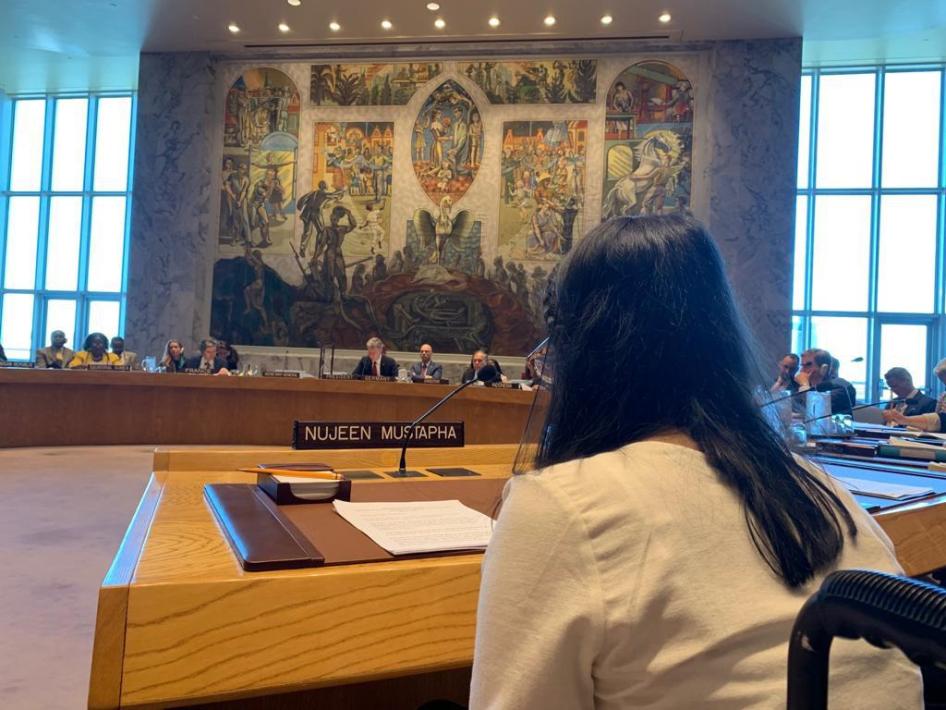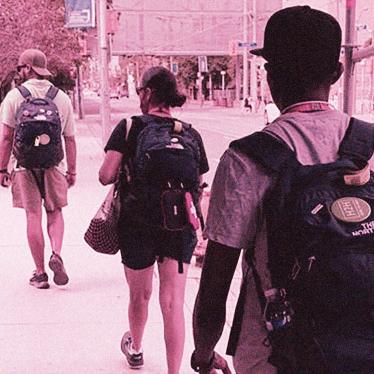Mustafa, 20, will be the first person with a disability to formally brief the Security Council, and one of very few Syrians given such an invitation since the Syrian conflict began in 2011. She fled Syria when she was 16 and has since travelled the world to advocate for governments and UN agencies to include people with disabilities in the humanitarian response. The Security Council should urgently act to improve the protection of people with disabilities in armed conflict, Human Rights Watch said.
“The UN Security Council has a duty to protect all civilians in armed conflict, including people with disabilities,” said Shantha Rau Barriga, disability rights director at Human Rights Watch. “Nujeen Mustafa’s briefing to the Security Council should prompt council members, the UN leadership, and all UN member states to ensure that their humanitarian commitment to ‘Leave no one behind’ is not just rhetoric.”
Mustafa has cerebral palsy and cannot walk independently. In January 2014, she began a harrowing 16-month, 5,600-kilometer journey from Syria to Germany in a steel wheelchair. She is currently a student in Germany. Mustafa is the recipient of Human Rights Watch’s 2019 Alison Des Forges Award for Extraordinary Activism.
The Syrian conflict, now in its eighth year, has been characterized by widespread and serious violations of international human rights and humanitarian law by all parties to the conflict, including indiscriminate attacks, the use of prohibited weapons, and restrictions on humanitarian aid. Nearly six million people have fled the hostilities, often taking arduous and life-threatening journeys to reach safety.
People with disabilities are among the most at-risk in humanitarian emergencies. As shelling, airstrikes, or raids threaten their lives, people with disabilities may not be able to run for safety. Those with intellectual or psychosocial disabilities (mental health conditions) may not understand danger. In the chaos of rushed evacuations, they also risk being separated from family members, or losing assistive devices, such as wheelchairs or hearing aids.
The situation is further complicated by countries’ refusal to accept more refugees or facilitate their ability to flee. People with disabilities have been disproportionately harmed by these violations and restrictions on the ability to seek refuge in other countries.
People with disabilities often struggle to access humanitarian aid, particularly in places like Syria, where aid providers have been attacked and where the government and anti-government armed groups have unlawfully restricted aid deliveries and the movement of civilians.
The humanitarian response in Syria and neighboring countries should include disability-inclusive protection programming and access for people with disabilities to basic services, including shelter, sanitation, health, psychosocial support, and education. Resources need to be dedicated toward evacuating civilians with disabilities from areas of hostilities.
The Security Council and member states should also ensure that neighboring and host countries facilitate the ability of civilians most at risk to escape violence, and dismantle policies that create additional risk for people with disabilities who attempt to flee. The council should also ensure that UN data collection, monitoring, and reporting on all conflicts includes the specific situation of people with disabilities, Human Rights Watch said. Otherwise, their needs and equal rights will continue to be overlooked.
The International Disability Alliance, a network of 14 global and regional organizations of persons with disabilities working to advance the rights of persons with disabilities with governments and the UN system, emphasized the need to consult people with disabilities about their situation.
“This Security Council briefing is an important step in recognizing the unique and disproportionate impact of conflict on persons with disabilities,” said Vladimir Cuk, executive director of the International Disability Alliance. “Close consultation with and active involvement of persons with disabilities and their representative organizations in humanitarian response is critical to address their situation on the ground.”








